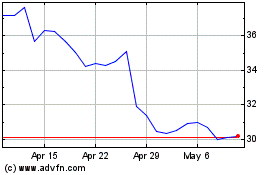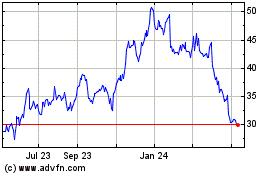By Asa Fitch
The U.S. has sharply slowed approvals for the nation's
semiconductor companies to hire Chinese nationals for advanced
engineering jobs, according to industry insiders, who say the
delays are limiting access to vital talent.
The disruption, which started last year, has affected hundreds
of jobs across the industry at companies including Intel Corp.,
Qualcomm Inc. and Globalfoundries Inc., impeding their ability to
hire Chinese employees or move existing employees to key projects
in the U.S., these people said. It is significant in part because
Chinese nationals account for a large share of non-U.S. citizens
hired for such technical roles, where the talent supply
domestically is often scarce.
Under rules in place for decades, companies must get licenses
before assigning workers with foreign nationalities -- Chinese,
Iranian, Russian among others -- to work on a list of sensitive
technologies. Because companies are giving foreigners knowledge
about technology they could eventually take home, the Commerce
Department considers such assignments the equivalent of an
export.
Approvals for so-called deemed-export licenses once took a
matter of weeks, whereas a wait of six to eight months isn't
unusual today, a person familiar with the process said.
Companies need them for existing and prospective foreign-citizen
employees working on advanced semiconductors, telecommunication
systems, encryption and other technologies. The level of scrutiny
varies depending on the technology and the perceived risk that it
could fall into the hands of U.S. adversaries. The licenses are
separate from work visas that employers also need to hire
foreigners who aren't permanent U.S. residents.
The slowdown cuts across industries but is especially
troublesome for chip makers, as the pool of people capable of doing
highly technical engineering work is shallow, industry insiders
say.
While there hasn't been a complete halt to the hiring of Chinese
nationals, the slowdown in license approvals has affected who could
be hired and who could be assigned to important engineering
projects, an industry insider said. "There have been longer delays
that have led us to lose candidates we thought were critical," the
person said.
From 2013 through 2017, Chinese nationals accounted for more
than 60% of approved licenses, according to the Commerce
Department. The Nos. 1 and 3 most commonly requested categories for
deemed exports in 2017 related to chips. The second-most-common
category covered telecommunications technology. The department
hasn't released 2018 statistics.
License approvals are slowing, as the White House engages in
efforts to protect American know-how against what government
officials have said is a concerted effort by China to obtain U.S.
technologies to build up its own capabilities, industry executives
said. U.S. authorities have blocked numerous tech-company
acquisitions involving China, including Broadcom Inc.'s hostile
takeover bid for Qualcomm Inc.
The Commerce Department reviews deemed-export applications
carefully in cooperation with other government agencies, such as
the state, defense and energy departments, a spokesman said. "This
review often includes requesting additional information from the
companies seeking to release controlled technology to foreign
nationals in the U.S.," he said.
Kevin Wolf, a lawyer at Akin Gump in Washington who was the
assistant secretary of the Commerce Department's export body during
the Obama administration, said the differences in the pace of
deemed-export approvals could reflect changed political
circumstances, though changing technology could also be playing a
role. If more applications involve especially sensitive
technologies, the time it takes to process them could be
longer.
The deemed-export issue is one of the sticky issues to emerge
against a monthslong backdrop of often heated trade and technology
talks between the U.S. and China.
In those talks, the Trump administration is seeking more
protections for U.S. intellectual property, a goal many in the
industry share. But the standoff also has been problematic for chip
makers that have had to cope with higher tariffs on imports and a
White House push for more sales to China, which they say would only
further intertwine the global supply chain with the country.
Talks toward a deal have stalled. The Trump administration last
week imposed higher tariffs on $200 billion of Chinese goods and
added Huawei Technologies Co. to a trade blacklist, making it
harder for U.S. companies to deal with the Chinese telecom
giant.
Foreign-born engineers have been important to chip-company
staffing over the years, said Linley Gwennap, president of the
Linley Group, a Silicon Valley semiconductor research outfit. "The
people from these countries have gone on to start companies in the
U.S.," he said. For example, Charles Liang, the chief executive
Super Micro Computer Inc., of San Jose, Calif., co-founded the
company after emigrating from Taiwan in the early 1990s and
studying in the U.S.
In addition to semiconductors, the restrictions cover certain
telecom-equipment, nuclear and military technologies.
Further restrictions on deemed exports to China could be on the
way next year, when the Commerce Department is to decide on
definitions of new technologies subject to export controls. Those
definitions could hit areas such as artificial intelligence, a huge
focus for chip makers and tech companies but also a major area of
U.S.-China technological competition.
Statutes suggest the definitions should avoid stifling
innovation and focus on technologies that could endanger national
security if they fell into the wrong hands.
Chip makers worry that the definitions will be too broad. The
Semiconductor Industry Association in January sent a letter asking
the Commerce Department to fully consider the economic impact of
the definitions and limit them to technologies with
national-security concerns, not trade-policy concerns.
Write to Asa Fitch at asa.fitch@wsj.com
(END) Dow Jones Newswires
May 21, 2019 05:44 ET (09:44 GMT)
Copyright (c) 2019 Dow Jones & Company, Inc.
Intel (NASDAQ:INTC)
Historical Stock Chart
From Mar 2024 to Apr 2024

Intel (NASDAQ:INTC)
Historical Stock Chart
From Apr 2023 to Apr 2024
